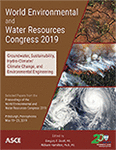World Environmental and Water Resources Congress 2019
Estimating Spatial Distribution of Hydrogeological Parameters from an Aquifer Pumping Test: The Value of Qualitative Prior Knowledge
Publication: World Environmental and Water Resources Congress 2019: Groundwater, Sustainability, Hydro-Climate/Climate Change, and Environmental Engineering
ABSTRACT
An aquifer pumping test in a hypothetical groundwater system is evaluated by calibrating a three-dimensional groundwater model using drawdown data from a 72-hour pumping test followed by a recovery period. Two different approaches are undertaken in estimating hydrogeological parameters (hydraulic conductivity and specific storage): 1) a zonation approach where there is prior knowledge of the spatial distribution of hydraulic conductivity; and 2) there is no knowledge of how hydraulic conductivity varies spatially. Both approaches use an inverse parameter estimation modeling code. In the first case, a limited number of parameters are estimated using zones delineated on the basis of spatial trends in lithology. The second case involves using pilot points, where pilot points are distributed evenly and at regular distances across the three layers of the groundwater system with each pilot point representing a hydraulic conductivity or specific storage value. A total of 14 parameters were estimated using the zonal approach by fitting the pumping test drawdown and recovery data against the simulated values and parameters compared against known values. Using the pilot point approach, a total of 506 pilot points was employed. In both cases, the simulated drawdowns closely followed the observed drawdowns in all 10 wells. The pilot point approach provided a heterogeneous distribution of parameters with more confidence of the estimates within the radius of influence of the aquifer pumping test. Overall, parameter values estimated using zonal approach were more accurate than those estimated using the pilot point approach, which indicates the value of even qualitative prior knowledge.
Get full access to this article
View all available purchase options and get full access to this chapter.
REFERENCES
Doherty, J.E. (2018). PEST, model-independent parameter estimation—User manual, 7thed., Watermark Numerical Computing, Brisbane, Australia.
Harbaugh, A.W., Banta, E.R., Hill, M.C., and McDonald, M.G. (2000). “MODFLOW-2000, the U.S. Geological Survey modular ground-water model -- User guide to modularization concepts and the Ground-Water Flow Process.” U.S. Geological Survey Open-File Report 00-92, U.S. Geological Survey, Reston, VA.
Hill, M.C., and Tiedeman, C.R. (2007). Effective groundwater model calibration: With analysis of data, sensitivities, predictions, and uncertainty, Wiley-Interscience, Hoboken, NJ.
Konikow, L.F., Hornberger, G.Z., Halford, K.J., and Hanson, R.T. (2009). “Revised multi-node well (MNW2) package for MODFLOW ground-water flow model.” U.S. Geological Survey Techniques and Methods 6-A30, U.S. Geological Survey, Reston, VA.
Information & Authors
Information
Published In
World Environmental and Water Resources Congress 2019: Groundwater, Sustainability, Hydro-Climate/Climate Change, and Environmental Engineering
Pages: 157 - 169
Editors: Gregory F. Scott and William Hamilton, Ph.D.
ISBN (Online): 978-0-7844-8234-6
Copyright
© 2019 American Society of Civil Engineers.
History
Published online: May 16, 2019
Authors
Metrics & Citations
Metrics
Citations
Download citation
If you have the appropriate software installed, you can download article citation data to the citation manager of your choice. Simply select your manager software from the list below and click Download.
